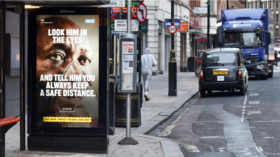If the prospect of AI ‘guide dogs’ for the blind makes you fear a dystopian future, don’t worry, there’s an app for that
As memories of the pre-Covid ‘old normal’ and real life fade, it’s time to relax and enjoy a Zoom vacation or attend a Zoom orgy. But is this actually the sort of virtual new world we want to ‘live’ in?
Even as World Economic Forum (WEF) founder Klaus Schwab admitted months into the Covid-19 pandemic that the outbreak was hardly the “new existential threat” the world was being told, humanity was being sold the idea that technology was our only hope for the future – and not just any kind of technology.
Transhumanism, a tech-based philosophy that seeks to merge our organic bodies with computerized enhancements, has been hailed by the likes of SpaceX founder and billionaire Elon Musk as humankind’s only option for “surviving” the rise of sentient machines – with the additional perk that as Earth continues to slide into a drought-ridden hellscape, those who miss the past can just jack in to their own private VR nostalgia trip – and stay there forever, collecting universal basic income and hopefully remembering to eat and drink once in a while.
Also on rt.com Byte worse than its bark? Armed robot dogs don’t belong in the US police – Black Mirror is not an instruction manual for officersFor those not quite ready to throw in the towel on reality but who are frustrated by the limits of their bodily hardware, a new “wearable AI system” is being designed by a group of researchers from the University of Georgia, supposedly to enable the blind to travel without the need for a real guide dog. Guided by a complex array of audio and video sensors, plus two-way voice feedback via Bluetooth, the entire construction fits in a backpack, waist pack and vest jacket – bulky but comparatively reasonable, the press release reassures the reader. Like Musk’s Neuralink, a forest of tiny fibers designed to be fused with as many as 1,000 neurons, this new as-yet-unnamed system, coming to a blind person sometime in the next few years, is being heralded by its creators as a way to improve the lives of disabled people.
Most such prototypes are initially shown off to the public as futuristic workarounds for people with disabilities, even if they were initially developed – often with the help of DARPA – to surveil, incapacitate, or kill. And the ones without weapons are somehow even creepier than the death machines (can I interest you in a ‘smart toilet’?), seemingly designed solely to serve the country’s addiction to data, though it remains unclear how Wall Street is supposed to securitize the bathroom habits of a given community – and whether investors would be better off going long or short on it.
However, there’s more to this University of Georgia program than merely outfitting the blind with a hefty hulk of backpack-bound wayfinding equipment whispering directions into their ears. The backpacks containing the hardware are fitted with GPS, operating on a principle similar to self-driving cars – technology that has long made people skittish to the point where, as of last year, three out of four humans didn’t want inanimate objects behind the wheel, no matter how much propaganda the industry threw at them. So the university’s model doubles as a reliable surveillance device while encouraging and normalizing “interaction” with the AI –
specifically, taking orders from it. With this foot in the door, humans will be learning to obey more anthropomorphic models of robots – the ones many are likely already training to replace them in their jobs.
Covid-19 has kicked these developments into high gear, with leaders promising the equivalent of ‘a Spot in every pot’. Entire industries are demanding to be made whole despite their jobs having ceased to exist or been taken over by robots, and the threat of the Fourth Industrial Revolution is suddenly looming over the horizon – not voted on by anyone but demanding to be embraced by all. Hundreds of thousands of jobs in just the oil and gas sector are likely to be lost in the turnover over the 10 years alone, according to industry analysts. Not everyone wants to ‘learn to code,’ yet these apparently reassuring refrains are thrown around tirelessly. Why should anyone want to take up the ignominious job of creating or training what are, essentially, their future masters?
Augmented reality, VR, or simply telecommunications won’t just be for the rich – already the media are reporting salaciously on “Zoom orgies,” insisting “Zoom vacations” are just as good as the real thing, and gushing over how innovative a university is that holds its graduations via Zoom. A Canadian ‘artist’ named Krista Kim recently sold ‘Mars House,’ a “digital home” that cost more, at $500,000, than many Canadians’ real homes. And NFT (non-fungible token) virtual art has become bafflingly popular as the rich run out of things to buy. And in the words of the WEF, in the near future, “you will own nothing, and you will be happy.” In just a year, how much memory of the ‘real thing’ – whether that’s sex, travel, or just a roof over one’s head – has humanity lost?
Also on rt.com Civil war, medical discrimination, spy satellites and cyborgs! How 2021 could make us yearn for 2020We can thank the Pentagon for VR, too – and for being so willing to experiment with the lives and brains of its soldiers that it paid Microsoft $21 billion to subject them to a glitchy version of its ‘augmented reality’ headset. Running on Microsoft’s Azure cloud, the company’s Integrated Visual Augmented System is already walking on eggshells after the company suffered a massive hack earlier this year. Once these machines start slurping up your (un)conscious mind, the ability to wreak havoc on an individual’s mental state goes through the roof. Indeed, there are plenty of good reasons to worry about the security of these new systems, though they’re rarely, if ever, discussed.
Not only could a hacker steer the user of one of these augmented reality headsets for the blind into oncoming traffic; he could also have the user’s sensors overloaded and his battery drained. The trauma resulting from having one’s AI service backpack “guide dog” lose its mind in the middle of a crowded train station, causing who knows what kind of behavior in its “owner,” provides plenty of nightmare fodder, and even getting caught in an unfamiliar place with dead batteries is guaranteed to trigger stress.
Like this story? Share it with a friend!
The statements, views and opinions expressed in this column are solely those of the author and do not necessarily represent those of RT.















